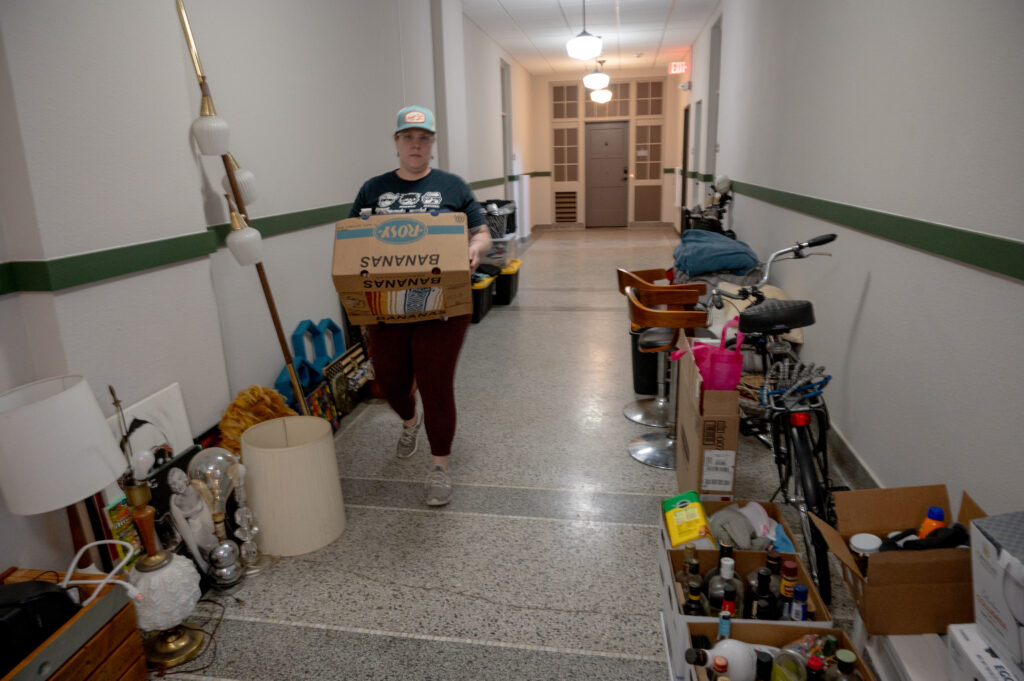Jenna Kasten did not want to leave Door County.
She spent her formative years here and it is where most of her family and friends are, but Kasten and partner Ian Ebert can no longer afford housing in the county. The couple moved to Ebert’s hometown of Fond Du Lac at the end of June.
“I’m out of choices,” Kasten said. (Disclosure: Kasten is also a donor to Knock.)
The couple is not unique in their struggle to pay for housing. According to a study commissioned by the Door County Economic Development Corporation in 2019, at least 1,070 affordable housing units would have been necessary in the county from 2018 to 2023 to meet existing needs. Those homes had to cost between $60,000 and $124,900 to be affordable, according to the study.
The average cost of a home in Door County in 2024 is $385,734, according to real estate site Zillow.
Households who pay more than 30 percent of their income for housing are considered “cost burdened” and may have difficulty affording necessities such as food, clothing, transportation and medical care, according to a long-standing definition from the U.S. Department of Housing and Urban Development.
After the 2019 housing study highlighted the growing affordable housing crisis in Door County that is reflected throughout the United States, local officials, organizations and community members continued their work to find solutions to the problem.
Five years later, the need for affordable housing prevails, particularly workforce housing, according to an ongoing DCEDC business survey released in early 2024. Of 83 respondents, 77 percent of those hiring said housing is a major challenge in their hiring process.
DCEDC hosted a luncheon in May to discuss the ongoing needs. Titled “Creative Solutions to Workforce Housing,” the event was marketed to employers in Door County who were interested in learning about the issue. There were roughly 20 attendees including local employers and nonprofit representatives.
ALICE at play
Until their moving date of June 30, Kasten and Ebert rented a two-bedroom apartment in the Sawyer School Lofts development in Sturgeon Bay. At $1230 per month, their rent outstripped HUD’s definition of affordable.
The Sawyer School Lofts complex was developed with help from $1.4 million in Door County Community Development Block Grant funding. One of the requirements of the funding is that 51 percent of the units in the development must be rented at an affordable rate for low- to moderate-income households.
Maximum allowed incomes for affordable units are determined as either 30 percent, 50 percent or 80 percent of the median income for the area. According to 2022 census data, Door County’s median income is $68,257. Sawyer School Lofts uses the highest end of the percentage scale at 80 percent to determine maximum allowable income.
With two people working full-time, Kasten said, her household’s income was just over the maximum allowed income to secure an affordable unit. She and Ebert still had a budget shortfall of a couple hundred dollars a month.
Kasten and Ebert had been relying on selling personal belongings and their own plasma to bridge the gap. (Plasma is the clear liquid part of blood that remains after red and white blood cells, platelets and other cellular makeup is removed. Though the process is often referred to as “donating plasma,” people are usually compensated for it.)
The couple did not have time outside of work, Kasten said, and they could not afford to take advantage of all the things that make Door County a desirable place to live, like recreation, live music, arts and cultural activities, and dining.
“That isn’t a way to live,” she said.

Kasten and Ebert fall under the United Way’s ALICE designation, an acronym coined by the organization. It stands for Asset Limited Income Constrained Employed: the working poor.
ALICE data is more granular than HUD’s definitions of affordability and cost-burden, taking into account things like family size, child care needs, debt and other nuances.
ALICE households have income just above the federal poverty level but not enough to meet basic needs like housing, food, healthcare, child care and transportation. Often ALICE households do not qualify for any government assistance, according to United Way reports.
Kasten’s household, despite struggling to meet basic needs, does not qualify for any assistance because they make too much money according to existing qualifications, she said.
The couple was unable to find an affordable living situation in Door County after they lost the space they were subletting last summer, Kasten said. The Sawyer School Lofts was one of the only places with vacancies at the time, but the rent was much higher than what they had been paying for the sublet.
With rent almost doubling overnight and their income staying the same, according to Kasten, they felt exhausted and cornered.
Until their move at the end of June, Kasten and Ebert both worked more than 40 hours a week in Door County. Kasten held two part-time jobs and ran what she described as a “mini-marketing agency” for a few local businesses. Ebert has a job with Kwik Trip after being laid off from his manufacturing job in late 2023.
One of Kasten’s jobs is remote and moved with her, she said, and Ebert was able to transfer to another Kwik Trip in the Fond du Lac area.
Discussions held, actions taken
A lot has happened since DCEDC’s housing study in 2019. A global pandemic, inflation in building costs, construction worker shortages and a record-breaking real estate market combined to make the affordable housing situation even more desperate today, according to a presentation by Mariah Goode at the May luncheon.
Goode is Door County’s Land Use Services director and holds a stack of other titles related to housing. She is the DCEDC attainable housing committee chair, a Door County Housing Partnership board member, and the Workforce Housing Lending Corporation’s technical advisory team co-chair.
Community organizations and leaders had taken steps toward addressing affordable housing in Door County before the 2019 study was released, according to Goode, but new projects have been initiated in the study’s wake. Many of those projects were outlined at the luncheon for attendees:
- The Door County Housing Partnership was established in 2019 and is a nonprofit organization dedicated to creating permanently affordable housing for year-round residents. The organization is a housing trust, which works by acquiring or building homes and setting the purchase price based on long-term affordability for targeted income households. The housing trust bridges the gap between household income and housing costs.
- DCEDC‘s attainable housing committee was restarted in 2024 and aims to be a clearinghouse of sorts for developers and housing initiatives in Door County.
- In 2020 Door County was chosen as one of three communities to participate in the Wisconsin Housing and Economic Development Authority’s Rural Affordable Workforce Housing Initiative. As a result, WHEDA gave the county’s Workforce Lending Corporation $1.5 million in matching funds to provide financial incentives for developers to build affordable rental units in Door County.
Representation matters
A lot of the work that has been done is moving in the right direction, Kasten said, but there is still a gap wherein she and Ebert fall. Home ownership is not even on their radar, she said. They just need an affordable place to rent.
She said she would like the people hosting and attending luncheons and discussions like the one in May to understand what it feels like to be in her shoes. Most of the decision-makers are secure in their housing and financial situations, Kasten added.
ALICE households and other populations cost-burdened by the price of housing are not represented enough in decisions, Kasten said, because discussions are often inaccessible to people like her and Ebert. Meetings are scheduled during work times, she said, and those who are struggling to pay for basic necessities simply do not have the time and energy to participate.

While it is technically true that most of the people making decisions about housing are not the ones seeking housing, according to Goode, it is also fair and true to say that everyone involved is “very well aware of this population.”
Bankers, loan officers, real estate agents, government officials, and housing and financial service nonprofit representatives work closely with potential renters and homebuyers and understand what their needs are, she said.
Leslie Boden is a certified financial social worker and the director of Money Management Counselors, a nonprofit organization in Sturgeon Bay that provides counseling to help people improve their financial literacy and meet financial goals. It is the only organization of its kind in Door or Kewaunee counties.
Boden said her organization sees a “massive cross-section” of the population. Money Management Counselors’ existing clients range from 18 to 79 years old, with 54 percent in the 30-49 year old range, the same age group Kasten and Ebert fall into.
Her clients most often seek services for help with credit card and student loan debt, bankruptcy, and first-time home ownership, Boden said.
Boden agreed with Kasten that there is not enough representation at discussion and decision-making tables, for some of the same reasons she mentioned: most meetings are held during work hours and people like Kasten and Ebert are burned out.
“How can you do housing when you’re not hearing from people who actually need housing?” Boden said.
Jumping ship
Another reason folks experiencing housing insecurity are not heard from enough, according to Kasten, is simply because they leave.
“I think about that a lot when I look at every short term rental property that displaced someone whether it was by choice or not,” she said.
Phil Berndt, director of partner services at Destination Door County, attended the DCEDC luncheon in May. He has been working on housing issues for years, he said.
When the DCEDC housing survey results were released in 2019, “we had already hit the iceberg,” Berndt said. “Now it’s a matter of not letting the ship go down.”
Workforce members moving away, Berndt said, is part of what is contributing to the sinking ship analogy.
Kasten agreed and predicted that eventually businesses will not be able to provide the experience tourism organizations like Berndt’s are touting, and the county will lose repeat visitors.
Kasten said she knows a lot of people in similar situations to hers who have left Door County for not necessarily greener, but cheaper pastures.
“That’s literally the most powerful thing anyone can do in any space is unsubscribe,” she said, “And that’s what I’m doing to Door County.”
Correction: A previous version of this story misspelled the last name of one member of a couple featured in the story. It is Ian Ebert, not Eberts. The story has been corrected.

